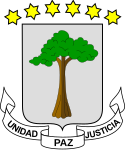| Registered | 137,755 | |||||||||||||||||||||
|---|---|---|---|---|---|---|---|---|---|---|---|---|---|---|---|---|---|---|---|---|---|---|
Presidential election | ||||||||||||||||||||||
| ||||||||||||||||||||||
| Turnout | 67.48% (first round) 79.20% (second round) | |||||||||||||||||||||
| ||||||||||||||||||||||
| ||||||||||||||||||||||
| ||||||||||||||||||||||
All 35 seats in the National Assembly 18 seats needed for a majority | ||||||||||||||||||||||
This lists parties that won seats. See the complete results below.
| ||||||||||||||||||||||
 |
|---|
General elections were held in Spanish Guinea on 22 September 1968 to elect a President and National Assembly that would lead the country when it gained independence as Equatorial Guinea later that year. A second round of the presidential election was held on 29 September.
Contents
Francisco Macías Nguema of the Popular Idea led the field in the first round, advancing to a runoff with Prime Minister Bonifacio Ondó Edú. With the endorsement of eliminated candidates Atanasio Ndongo and Edmundo Bossio, Macías Nguema defeated Ondó Edú in the runoff. Ondó Edú's National Unity Movement and Ndongo's National Liberation Movement won ten seats each in the National Assembly, while the Popular Idea won eight. [1] Voter turnout was 67 percent in the first round and 79 percent in the second round.
After Macias Nguema's victory, he appointed Ndongo as Equatorial Guinea's first Foreign Minister and Bossio as Vice-President, while he ordered Ondó Edú's execution shortly after independence. To date, it has been the only free election ever held in Equatorial Guinea. Over the next four years, Macias Nguema consolidated his power step by step; in 1970 he set up the United National Workers' Party as the only legally permitted party in the country and by 1972 he had declared himself President for Life with dictatorial powers. As a result, the 1968 elections would be the last contested elections held in the country until 1993.





